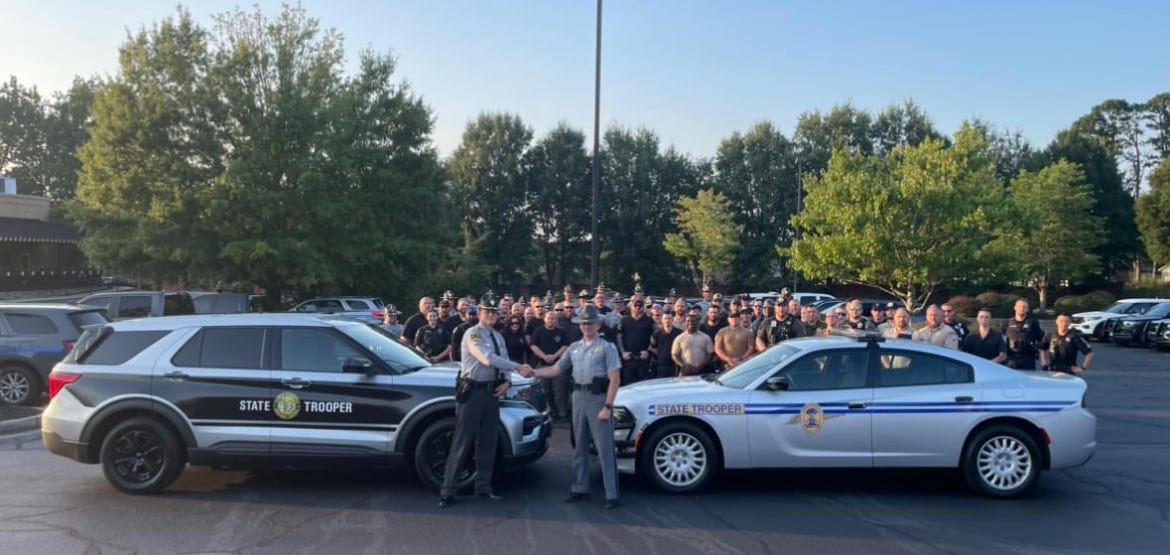Exclusive details: Carolina cops team up in ‘Hands Across the Border’ enforcement
Multi-agency effort targets impaired driving and criminal activity along NC-SC line during Labor Day Booze It & Lose It campaign.
This week, the Rutherford County Sheriff’s Office, in collaboration with numerous law enforcement agencies, participated in the "Hands Across the Border" event along the North Carolina and South Carolina line. The event, in conjunction with the North Carolina Governor’s Highway Safety Program 2024 Labor Day Booze It & Lose It campaign, focused on reducing impaired driving and enhancing public safety across both states. The Labor Day enforcement continues through next week.
The joint operation, held on August 26, 2024, resulted in substantial enforcement actions, including:
Traffic Violations: 24
DWI Investigations: 3
Drug Violations: 9
Wanted Persons Apprehended: 1
Marijuana Seized: 65 grams
Psilocybin Seized: 4 grams
Methamphetamine Seized: 1 gram
Guns Seized: 1
These figures reflect only the results from North Carolina agencies. South Carolina partners also reported multiple traffic offenses, felony drug arrests, and illegal firearm seizures, according to the press release.
Sheriff Aaron Ellenburg expressed his gratitude for the cooperative efforts, highlighting the critical roles played by Rutherford County Emergency Management, Rutherford County Communications, Rutherfordton Police Department, Spindale Police Department, North Carolina Highway Patrol, South Carolina Highway Patrol, Spartanburg County Sheriff’s Office, Cherokee County Sheriff’s Office, and the South Carolina Department of Public Safety in ensuring the operation’s success.
Cops & Congress Commentary: The Importance of Cross-Border Relationships in Modern Policing
When we think of borders, the first image that comes to mind is often national boundaries between countries. But within our nation, county borders can be just as significant—especially concerning policing and public safety. In areas where counties in different states share a border, like Rutherford County in North Carolina and neighboring counties in South Carolina, law enforcement must transcend these invisible lines to ensure public safety in a seamless, coordinated manner.
The recent "Hands Across the Border" operation along the North Carolina-South Carolina line is a prime example of how modern-day policing thrives on collaboration. This multi-agency effort, involving local law enforcement from both states, was instrumental in reducing the number of impaired drivers, seizing illegal drugs, and apprehending criminals. Without such cooperation, the outcomes of this initiative would likely have been far less impactful.
But why is this cross-border cooperation so crucial in today’s policing? The answer lies in the nature of crime itself. Criminal activity doesn’t respect jurisdictional boundaries. A suspect fleeing from one county can easily slip across the state line if law enforcement agencies aren’t working together. Moreover, the challenges of modern policing—ranging from drug trafficking to human trafficking—require a united front, with resources pooled and intelligence shared across state lines. In my view, as someone who’s covered cops since 2001, there’s good and bad to this shared constitutional responsibility.
The Good:
Enhanced Crime-Fighting Capabilities: By working together, law enforcement agencies can pool resources and share intelligence, making it easier to tackle crimes that span multiple jurisdictions, such as drug trafficking or organized crime. This united front significantly increases the effectiveness of crime-fighting efforts.
Seamless Enforcement: Cross-border partnerships ensure criminals cannot exploit jurisdictional boundaries to evade justice. This seamless enforcement helps maintain public safety across larger areas, reassuring residents that law enforcement is cohesive and coordinated.
Community Trust: When law enforcement agencies collaborate, it builds trust within the community. Residents see their safety as a priority, no matter which side of the state line they are on. This sense of security strengthens community ties and fosters a positive relationship between the public and the police.
The Bad:
Jurisdictional Confusion: Differences in state laws and enforcement priorities can lead to confusion or conflicts during cross-border operations. Officers may be unsure which protocols to follow, potentially compromising the effectiveness of enforcement efforts.
Resource Strain: While collaboration can pool resources, it can also strain them. Smaller agencies might find their assets stretched thin when participating in large, multi-agency operations, which could impact their ability to respond to local issues.
Potential for Overreach: Cross-border operations might lead to concerns about overreach, where agencies from one state enforce laws in another jurisdiction. This could raise questions about accountability and the balance of power between local and state authorities.
The success of operations like "Hands Across the Border" underscores the necessity of building strong, trusting relationships between agencies in neighboring jurisdictions. This collaboration not only enhances the effectiveness of law enforcement but also ensures that criminals cannot exploit jurisdictional gaps to evade justice.
However, the challenges of such partnerships should not be overlooked. Differences in state laws, variations in enforcement priorities, and logistical hurdles can complicate joint operations. To overcome these challenges, agencies must invest in continuous communication, joint training exercises, and establishing shared protocols that streamline operations across state lines.
Furthermore, these cross-border relationships are not just about enforcement; they’re also about community trust. When residents in border counties see their law enforcement agencies working together, they gain confidence that their safety is a priority, regardless of which side of the state line they’re on. This builds stronger communities and reinforces the role of law enforcement as protectors, not just in their own county but as part of a larger, interconnected network.
In an era where crime is increasingly sophisticated and often spans multiple jurisdictions, the importance of cross-border relationships in modern-day policing cannot be overstated.
The "Hands Across the Border" event is a testament to what can be achieved when agencies set aside territorial concerns and work together toward a common goal: safety and security of the public. As we look to the future of policing, fostering these relationships will be key to addressing the evolving challenges of law enforcement in the 21st century as technology evolves.
Situational awareness: An exclusive, or scoop is an important news story that is first reported by a journalist. This goes beyond breaking news when no other journalists are known to be reporting on an important issue.
This article is free to read due to generous support from founding member subscribers. Thank you. Please support my future work. (ICYMI: Six reasons to support my independent journalism)
🏛️ All those mentioned are presumed innocent until proven guilty.
Learn more about this newsletter and my background. I am guided by the Society for Professional Journalists Code of Ethics. Follow me on X (Twitter), Facebook, Linkedin, Instagram, TikTok, and YouTube. Send constructive criticism, fan mail and tips with public documents for future stories: CopsandCongress@gmail.com.
Interested in sponsoring a future issue of Cops & Congress? Email me with your ideas and budget.
(Free subscribers: Upgrade to paid to leave a comment below and don’t miss out on exclusive content.)




